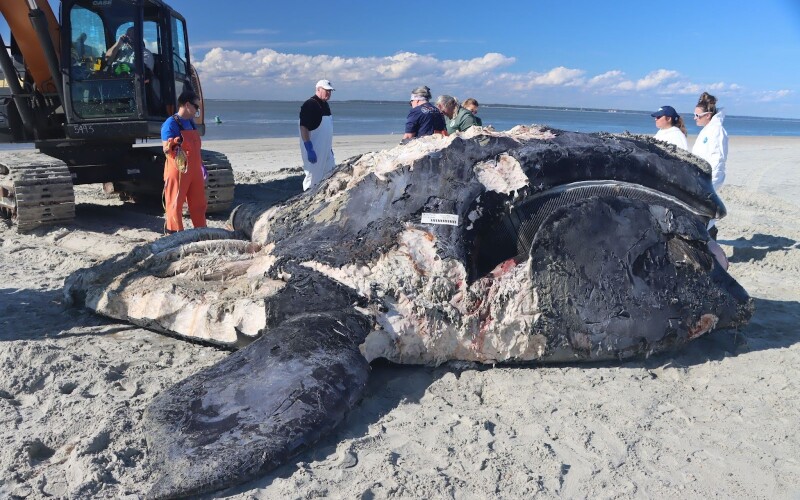A North Atlantic right whale spotted floating dead off Savannah, Ga., was identified as a young female, with injuries showing it was struck by a vessel, the National Oceanic and Atmospheric Administration said Friday.
The whale was first seen by whale researchers as a calve in December 2022. Towed 20 miles to Tybee Island for a necropsy, the whale showed “evidence of blunt force trauma including fractures of the skull. The injuries are consistent with a vessel strike prior to death,” according to a NOAA update.
The agency brought in partners for necropsy including the University of North Carolina, the Florida Fish and Wildlife Conservation Commission, Blue World Research Institute, Georgia Department of Natural Resources, the Clearwater Marine Aquarium whose aerial survey team first spotted the whale, the University of Florida, Savannah State University and the Low Country Marine Mammal Stranding Network.
The Georgia incident is the 38th mortality in an ongoing Unusual Mortality Event as NOAA calls it beginning in 2017. After a slow rebuilding until around 2010, the highly endangered right whale population has declined aa more whales were reported lost to ship strikes and fishing gear entanglement.
The Georgia incident followed the discovery Jan. 28 of a dead juvenile right whale at Martha’s Vineyard, Mass. After a necropsy NOAA Fisheries officials said the whale had been entangled in fishing gear that showed evidence of coming from the Maine state waters lobster fishery.
The losses brought renewed calls from environmental activists for more action by NOAA on fishing gear and vessel strike dangers to the right whale population, now estimated at less than 360 animals including 70 breeding females.
Waters off the Southeast U.S. states of South Carolina, Georgia and Florida are winter calving grounds for right whales. NOAA alerts vessel operators to watch out for whales when observers see them on the move near port approaches.
Since 2008 a NOAA rule has called for commercial vessels over 65 feet in length to slow to 10 knots in seasonal speed zones. The agency proposed extending the speed limit down to vessels 35 feet in length, but that’s met determined opposition from small passenger vessel owners, party and charter fishing operators and the recreational fishing and boatbuilding industries.
Environmental groups pressed their case for the expanded speed limit.
“How many more right whales need to die needless deaths before the Biden administration will finally act to protect them from vessel strikes?” said Jane Davenport, senior attorney at Defenders of Wildlife, which has been pushing form an expanded speed rule annually since 2020.
NOAA proposed extending the speed limit in August 2022, and environmental groups then stood down from their lawsuit trying to force the issue. But on Feb. 13 they moved to restart the litigation.







